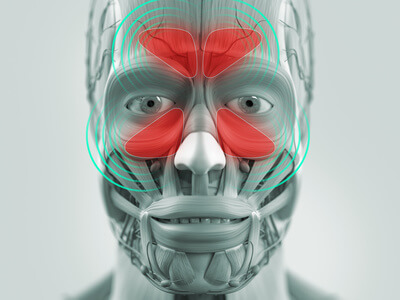Chronic Sinusitis: Causes, Symptoms, and Treatments

Sinuses are small cavities within the face, forehead, and nose, which are filled with air. These spaces produce mucus to help trap and clear pollutants in the nasal passages. Sinusitis is the condition wherein the tissue in the cavities swell, thereby blocking the sinuses and leading to pain, and in some cases, bacterial infections. When these symptoms last for up to 4 weeks, they are known as acute sinusitis. If, however, the symptoms become persistent for at least 12 weeks or more, despite regular medication, they become chronic and are termed as Chronic Sinusitis. Through this blog, we take a closer look at the disorder by highlighting its causes, symptoms, and treatments. Let’s begin.

Causes
Similar factors cause acute sinusitis and chronic sinusitis. Often times, chronic sinusitis is the result of an acute sinusitis that does not resolve due to the following exacerbating factors:
- Dental infections
- Cold of Flu
- Asthma
- Cystic fibrosis
- Inflammatory disorders including sarcoidosis and Wegener’s granulomatosis
- Smoking
- Diabetes
- Earlier injuries to cheeks or nose
- Pregnancy
- Weak immune system
Symptoms
Adults
Blocked nose or any other type of nasal obstruction is the most notable symptom found in sinusitis patients. Other symptoms may include:
- Runny nose
- Impaired smell
- Mild facial discomfort
- Foul breath
- Headache
- Cough
- Tiredness
Children
- Snoring
- Breathing from mouth
- Problems in feeding
- Nasal speech
- Irritability
Treatments
Decongestants
Decongestants help reduce the swelling of membranes in the nose, making it easier for the person to breathe. These medicines come in both tablet and spray forms. Standard examples include Contac, Sudafed, Afrin, and Dristan. These should be used sparingly, never for more than 2-3 days at a time, as chronic use can lead to severe rebound nasal congestion making the the initial congestion even worse than before.
Antibiotics
Antibiotics are prescribed when the doctor feels that the sinusitis is caused by a bacterial infection. Their medication course usually depends on the person’s health, the antibiotic in use, and the complexity of the sinusitis.
Steroids
Inhaling steroids is yet another treatment that doctors may use to bring down the swelling in the sinus membranes. In some cases, the patient may also be prescribed oral steroids. These are particularly useful in patients with nasal polyps.
Anti-allergics
One of the reasons behind sinusitis is allergies. Allergy testing can help find out if the patient is allergic to pollutants, environmental allergens, or certain foods, and get the right treatment for it, which often includes antihistamines. Allergy shots also help reduce the sensitivity to an allergy, but they are usually used as a long-term treatment.
Surgery
If sinus symptoms persist after the standard treatments of antibiotics and steroids, then surgery is the recommended treatment. Endoscopic surgery, wherein small bones or other material blocking the sinus openings are removed, is an effective treatment option.
Why Visit an ENT Specialist?
The reason for chronic sinusitis and its symptoms are not the same for every person. While it is asthma or nasal allergy for some, it is a chronic dental infection in the case of others. An ENT specialist can determine the exact underlying problem behind your sinusitis and suggest the right treatment. They can find out if any of the apparent abnormalities such as nasal polyps are the reason for sinusitis. Moreover, an ENT specialist will perform tests to see what reasons are prolonging the disease and whether or not a surgical treatment would be required for the sinus infection treatment. To book a consultation with one of our experts, call us at (713) 791-0700 or click here.

